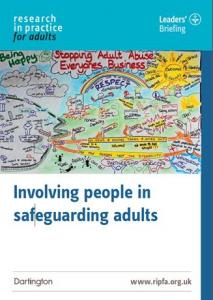Research in Practice for Adults (RiPfA)
Research in Practice
Our aim is to support people working in social care and health to improve outcomes for adults, their families and carers.
We bring together academic research, practice expertise and the experiences of people accessing services to enable professionals across the sector to make evidence-informed decisions about the design and delivery of Adults’ Services.
Supporting learning and development
We are independent of government and the focus of our work is driven in consultation with our national network of Partners to ensure it reflects the current challenges and priorities of the sector. Find out more about our Partnership network.
Once we have identified key issues, we commission leading academics and practitioners to gather evidence from research, putting it into context alongside practitioner expertise and knowledge, and the views and experiences of people accessing services.
We translate this evidence into accessible resources designed to meet the varied learning needs and styles of different audiences across an organisation, from frontline practitioners to Directors and Lead Members.
These resources include publications and events, workshops, conferences and online learning. We also carry out evaluation and commissioned work – including evidence reviews and training packages – tailored to the specific needs of our clients.
Research in Practice for Adults is a not-for-profit organisation. We are part of The Dartington Hall Trust, a charity working to improve the social, environmental and economic wellbeing of communities.
Research in Practice for Adults
Involving People in Safeguarding Adults
There has been a longstanding and increasing demand from people who use services and the public for ‘a greater voice in decisions about the shape and nature of services provided’ (Research in Practice for Adults, 2013). Gathering feedback from a wide range of stakeholders can help organisations to find out what works, for whom and how.
The briefing outlines evidence (by which we mean academic research, practitioner views and the views of people who use services) related to four key themes:
- Involving people in their own safeguarding.
- Finding out about adults’ experiences of safeguarding and gaining assurance of effectiveness.
- Providing good information and advice about safeguarding.
- Involving communities in the work of the SAB, including in prevention of abuse and neglect.
It also refers to a number of case studies from around England and extrapolates the learning from them. Please click on the link below for the full report.

ripfa_leaders_briefing_involving_people_in_safeguarding_adults_web_june2016
Wirral Tailored Support
Wirral requested support around one of their Safeguarding Adults Board priorities:
“The views of service users are heard and used to inform safeguarding practices and services”
This priority relates to both strategy (gaining involvement from individuals at a strategic level in order to influence strategy) and practice (gathering feedback about what is working well, or not, in safeguarding, in order to inform practice).
Wirral are at the start of their journey in this area and requested tailored support time to compile the evidence on service user involvement through the following sources:
Examples of practice in other local authorities
Research messages
Findings from the evaluation of Making Safeguarding Personal
Recommendations going forward. Please click on the link below for the full report.
